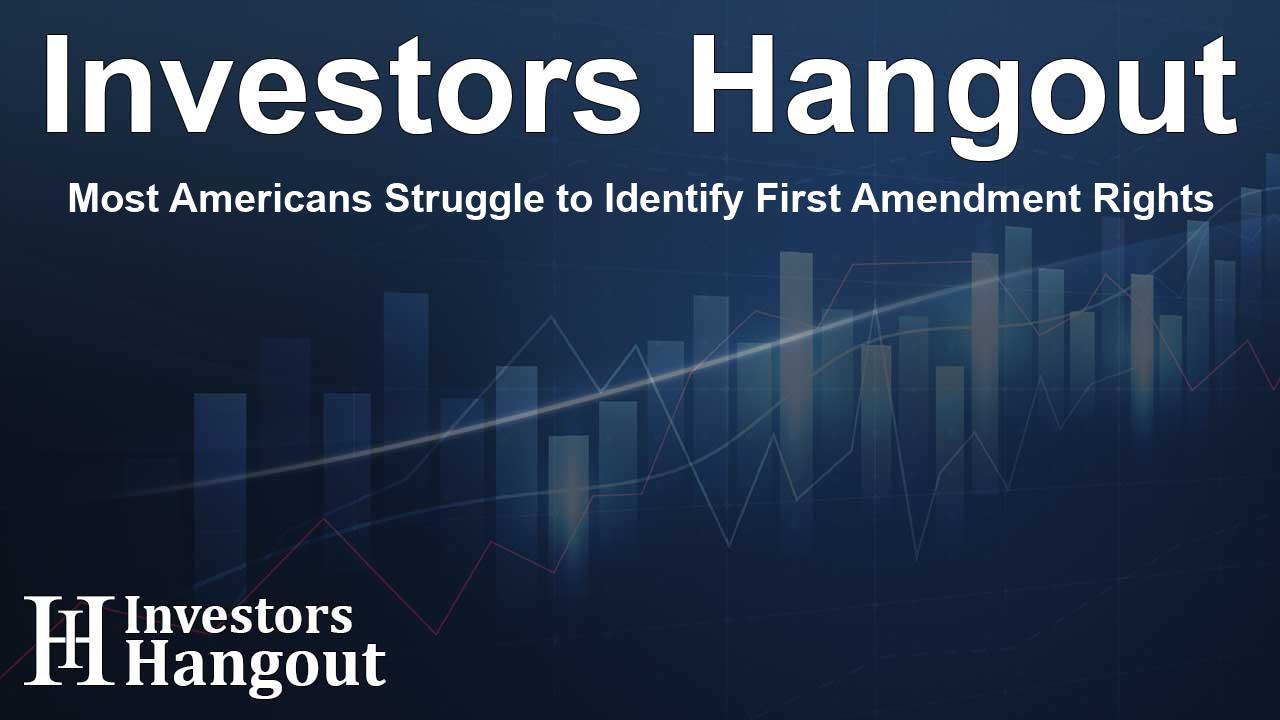Most Americans Struggle to Identify First Amendment Rights

Understanding the First Amendment: A Civic Challenge
The recent survey by the Annenberg Public Policy Center highlights a concerning trend in civic knowledge among Americans. Surprisingly, less than half of the adult population can identify most of the rights enshrined in the First Amendment of the U.S. Constitution. This finding, revealed through the Annenberg Constitution Day Civics Survey, emphasizes the importance of civic education while reflecting a significant gap in public understanding.
The Challenge of Civic Knowledge
The survey, conducted annually, assesses the awareness of fundamental rights and the branches of government. Findings indicate that only three-quarters of respondents could name freedom of speech, the most recognized right under the First Amendment. Unfortunately, recognition of other critical rights such as freedom of religion and freedom of the press remains low, with only 39% and 29% of respondents respectively able to identify them. This situation raises questions about how citizens value and exercise their constitutional rights.
The Vital Role of Civic Education
Civic knowledge plays a crucial role in a functioning democracy. Without an understanding of their rights, individuals may struggle to participate effectively in civic life. "Those who do not understand the rights protected by the Constitution can neither cherish nor invoke them," stated Kathleen Hall Jamieson, director of the Annenberg Public Policy Center, emphasizing the consequences of civic ignorance. As we approach significant political events, the need for enhanced civics education becomes increasingly apparent.
Government Branches Awareness
In the same survey, nearly two-thirds of respondents, approximately 65%, could accurately name the three branches of government. This statistic, while encouraging, still leaves room for improvement, as 15% of the participants could not name any branch. Efforts must be made to improve public awareness about governmental structures and their functions.
Support for Supreme Court Reforms
The Annenberg survey also touched upon public sentiment toward potentially reforming the U.S. Supreme Court. The findings revealed significant support for various proposed reforms, indicating a demand for greater accountability among justices. Among the reforms proposed, 82% of respondents favored prohibiting justices from participating in cases where they have personal or financial interests, suggesting a desire for ethical standards in the nation's highest judicial body.
Public Sentiment Towards Ethics and Accountability
Responses to the survey indicated that nearly 77% of Americans advocate for a formal ethics code for Supreme Court justices, reflecting a concern for transparency and ethics in legal adjudication. The ideas of term limits and mandatory retirement ages garnered support as well, suggesting a strong sentiment for revisions in the lifetime appointment tradition of justices. Public interest in reform underscores an evolving understanding of the court's role in democracy.
Conclusion: Bridging the Civic Knowledge Gap
Initiatives to enhance civics education are vital as we strive to build a more informed citizenry. Educational programs that focus on constitutional rights and governmental functions must be reinforced to foster civic participation. The Annenberg Public Policy Center continues to support educational efforts, acknowledging that informed citizens are essential for a healthy democracy. Their ongoing commitment to providing resources for enhancing civic knowledge can empower individuals to better understand their rights.
Frequently Asked Questions
Why is knowledge of the First Amendment important?
Understanding the First Amendment is crucial for recognizing and exercising personal freedoms, such as speech and religion. It is the foundation of democratic engagement.
What were the main findings of the Annenberg survey?
The survey revealed that many Americans struggle to name the rights protected by the First Amendment and highlights a need for improved civic education.
How do Americans feel about Supreme Court reforms?
A significant portion of the public supports reforms like ethical guidelines for justices and limitations on their participation in certain cases.
What can be done to improve civic education?
Enhancing civics education through school programs, community resources, and public initiatives can help bridge the knowledge gap regarding rights and government structures.
What role does the Annenberg Public Policy Center play?
The Annenberg Public Policy Center conducts surveys and provides educational resources to improve understanding of political, civic, and health issues among the public.
About Investors Hangout
Investors Hangout is a leading online stock forum for financial discussion and learning, offering a wide range of free tools and resources. It draws in traders of all levels, who exchange market knowledge, investigate trading tactics, and keep an eye on industry developments in real time. Featuring financial articles, stock message boards, quotes, charts, company profiles, and live news updates. Through cooperative learning and a wealth of informational resources, it helps users from novices creating their first portfolios to experts honing their techniques. Join Investors Hangout today: https://investorshangout.com/
Disclaimer: The content of this article is solely for general informational purposes only; it does not represent legal, financial, or investment advice. Investors Hangout does not offer financial advice; the author is not a licensed financial advisor. Consult a qualified advisor before making any financial or investment decisions based on this article. The author's interpretation of publicly available data shapes the opinions presented here; as a result, they should not be taken as advice to purchase, sell, or hold any securities mentioned or any other investments. The author does not guarantee the accuracy, completeness, or timeliness of any material, providing it "as is." Information and market conditions may change; past performance is not indicative of future outcomes. If any of the material offered here is inaccurate, please contact us for corrections.